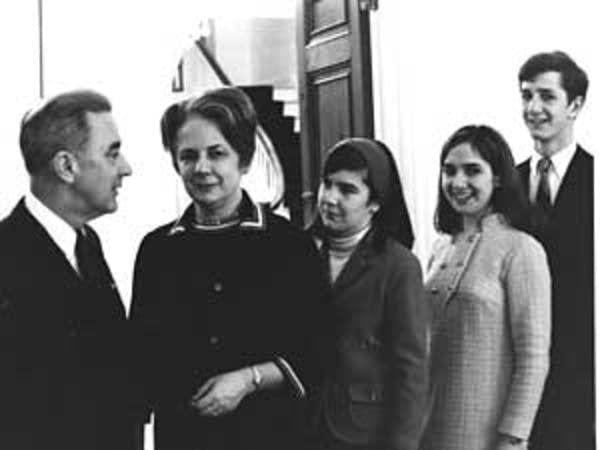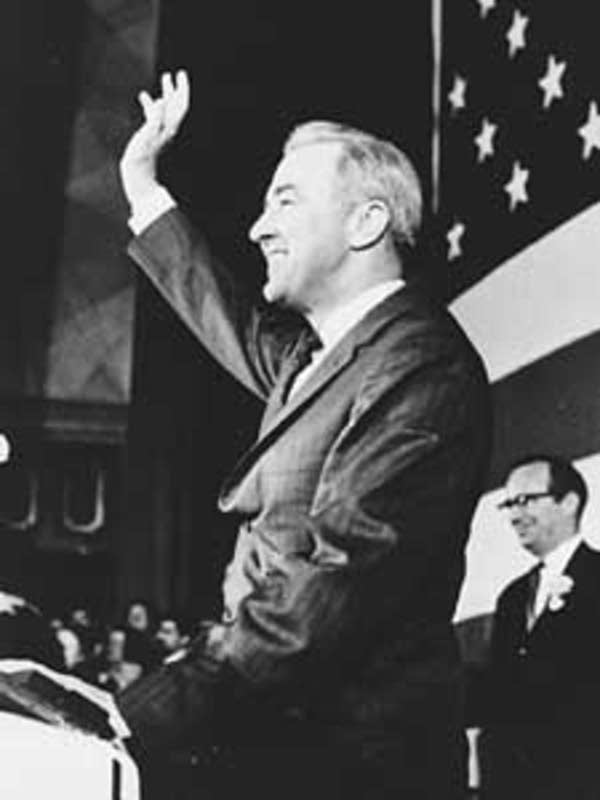After '68

Although Eugene McCarthy did not win the Democratic Party nomination for president in 1968, author Mark Kurlansky never viewed McCarthy as a failure.
DID MCCARTHY SUCCEED?
"When you talk about success and failure, you have to ask, what were the goals? And the goal was to be a vehicle for the anti-war movement. The goal was not to be president," said Kurlansky. "His supporters would have gladly seen him be president, but what he and his campaign were all about was giving a voice to the anti-war movement, and he did a spectacular job of that."
McCarthy eventually backed Humphrey after the vice president called for a conditional end of bombing in North Vietnam.
Create a More Connected Minnesota
MPR News is your trusted resource for the news you need. With your support, MPR News brings accessible, courageous journalism and authentic conversation to everyone - free of paywalls and barriers. Your gift makes a difference.
He was, of course, the epitome of the new politics -- that the people, not the party bosses, are the ones who should change policy. He proved that one man can make a difference.
But the lukewarm endorsement came on in a phone call on the eve of the 1968 election, as McCarthy tried one more time to make a public show of support for his old friend Hubert Humphrey.
"I hope I've cleared the way as far as I can so my friends are free to vote for you. Not only free, but I hope moved a little bit by what I've said recently. Good luck to you both tomorrow," McCarthy said.
"Well Gene, let me say before you get off the line, that many of the things you fought for you and I have discussed on our party reform and matters that relate to our State Department and foreign policy," said Humphrey. "These are matters that are going to be given our highest consideration."
"And particularly as it relates, as I told you, to the revitalization of the Democratic Party and making room in it for people of different points of view, in particular our young people," Humphrey continued. "This was your battle. You won that battle. And I intend to see, as your friend and as your cohort, that we will implement it. So chalk that one up as a great victory, will you?"
On Election Day, Nixon beat Humphrey by a narrow margin, and the war in Vietnam dragged on another six and a half years.
Humphrey supporters blamed the outcome on McCarthy and his late endorsement.
MCCARTHY AFTER '68
Dominic Sandbrook says the 1968 campaign took an enormous toll on McCarthy -- personally and politically.
"It soured his relationship with the Democratic Party, destroyed a lot of the links he had with other Democrats. It embittered his relationship between himself and Hubert Humphrey, previously his closest ally," Sandbrook said. "It also wreaked terrible havoc on McCarthy's private life. At the end of the year, his marriage collapsed, a lot of his personal friends became estranged. He moved out from the family home, moved into a hotel."

"He said himself in the years afterwards that he felt that his life had taken this turn that he didn't understand," said Sandbrook. "Had he not run for president and not undergone the searing experiences of that year, his life might have been very different, and quite conceivably a lot happier."
McCarthy served out the rest of his term in the U.S. Senate and did not seek re-election. Hubert Humphrey won the seat in 1970.
McCarthy tried for the Democratic nomination for president again in 1972 under a reformed, more-open selection process. He lost to George McGovern of South Dakota.
McCarthy made another unsuccessful bid in 1976, running as an independent. Two more futile presidential campaigns followed in 1988 and 1992.
HE MADE HISTORY
Still, it's the 1968 campaign that people remember him for most. A year, as journalist Al Eisele says, that assured McCarthy a place in history.

"He was, of course, the epitome of the new politics -- that the people, not the party bosses, are the ones who should change policy," said Eisele. "He proved that one man can make a difference by stirring up the public, serving as a catalyst in turning public opinion against the Vietnam War."
"What we were able to do was to give them a chance, within the framework of American politics, to make a public judgment," said McCarthy. "And this opportunity was afforded to them at a time when there were many who said our system could not be made responsive to this kind of challenge. That this democracy did not have the strength among its people to stand in mid course against a policy which was in progress, and to say, 'This policy is wrong and something must be done about it.' Well, we did out the people to that test and I think it's clear that they met the test."

